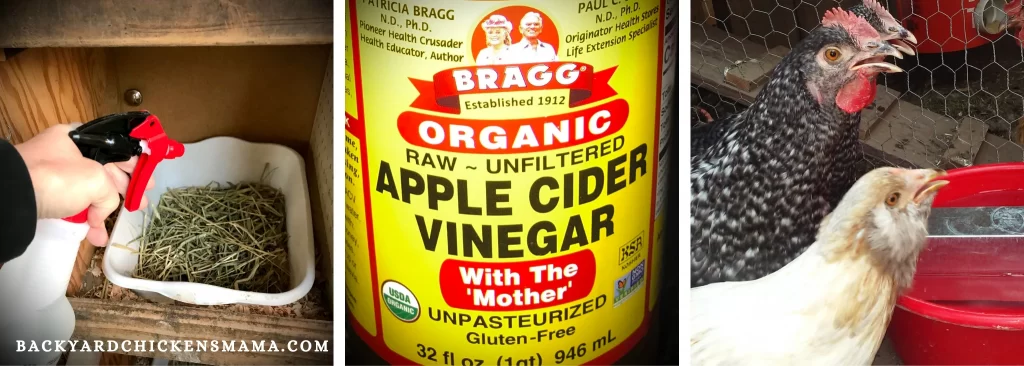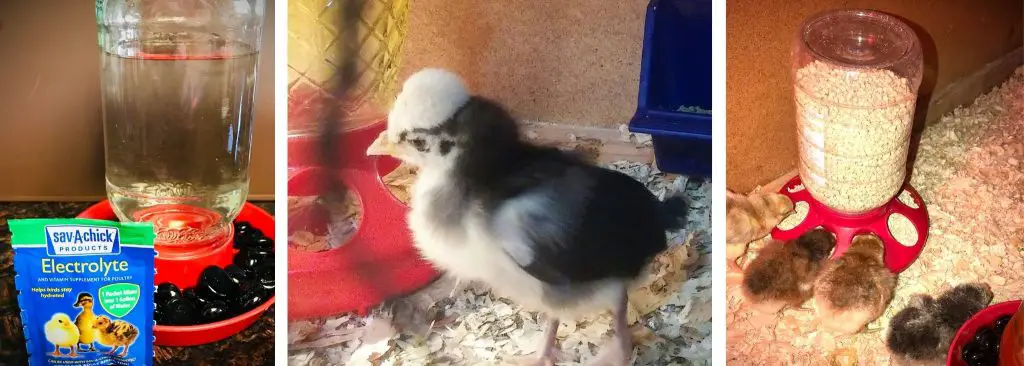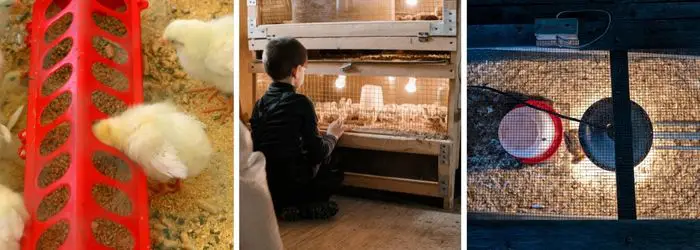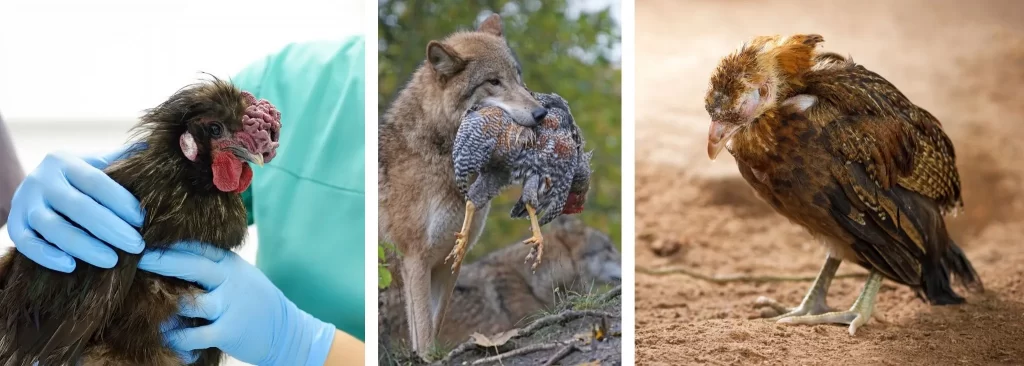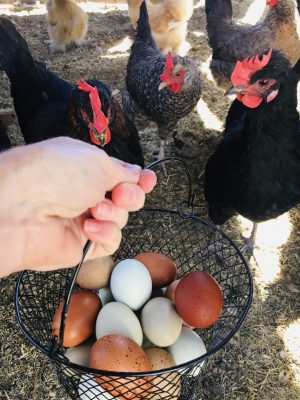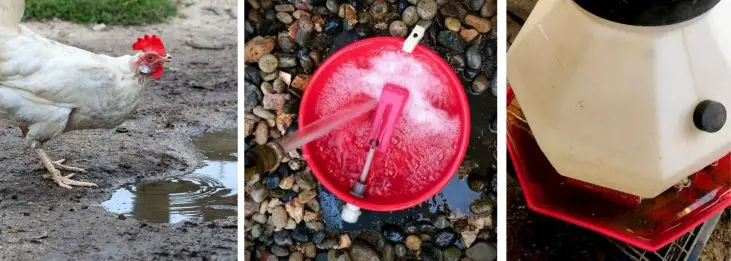
Nesting Box Herbs-Our #1 Best Seller!
Chickens will drink dirty water containing poop and pine shavings. But they really do prefer to consume clean water and will drink more of it, if it’s provided for them.
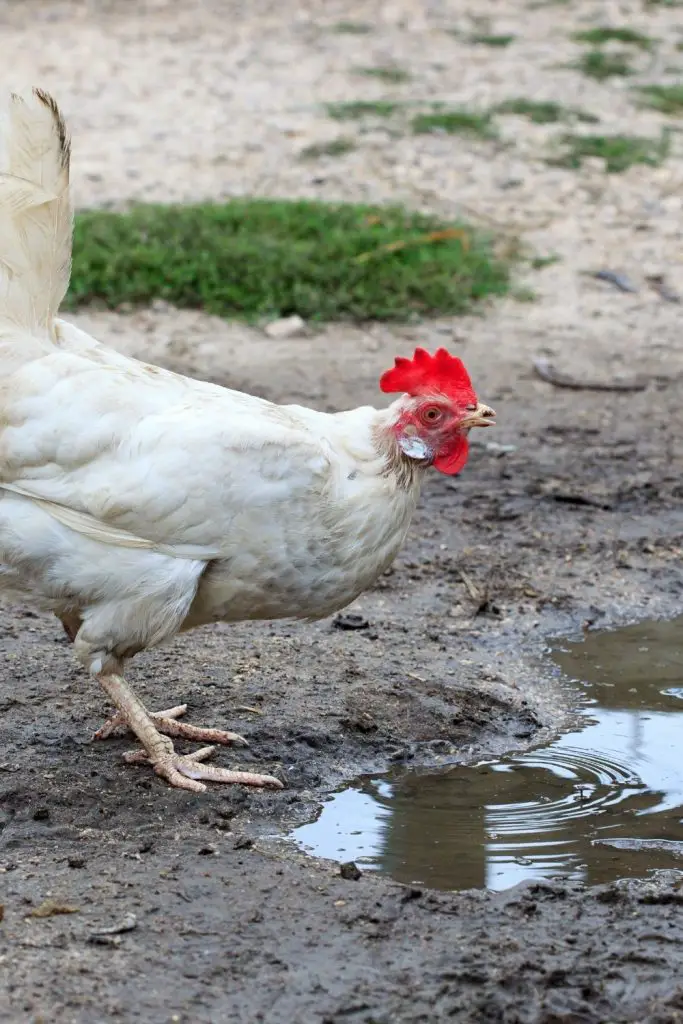
The average adult chicken drinks about a quart of water a day and up to twice this amount during hot weather. It is important to provide your flock with enough fresh, cool, clean water on a daily basis.
For more helpful tips on how to keep your chickens cool during the hot weather, read my article 17 Tips – How to Keep Chickens Cool in Extreme Heat.
- Nesting Box Herbs-Our #1 Best Seller!
- 1. How Often Should I Change My Chicken's Water?
- 2. How to Sanitize a Plastic Chicken Waterer
- 3. How to Sanitize a Metal Chicken Waterer
- 4. Should You Put Anything in Your Chicken's Water?
- 5. How to Keep Chicken Waterer from Growing Algae
- 6. How to Keep Baby Chick Waterers Clean
- 7. How to Identify Deadly Blue-Green Algae
- Conclusion: How to Keep Chicken Water Clean
1. How Often Should I Change My Chicken’s Water?
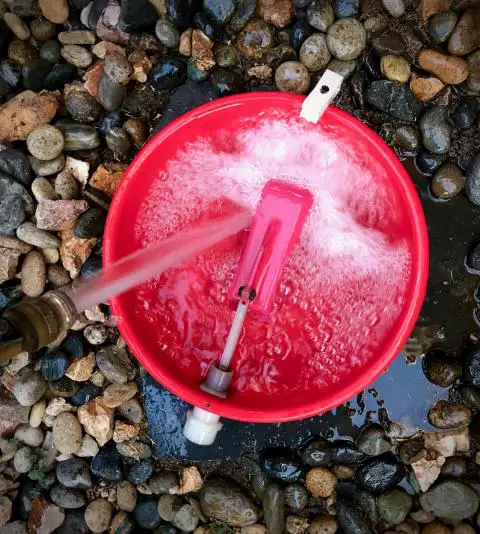
Chickens can make a mess of their water quickly, especially if it is in a location that is subject to filling with dirt and bedding when they are dust bathing or scratching the ground, foraging for food. It is always best to dump chicken water out daily(water your plants with it) instead of topping off.
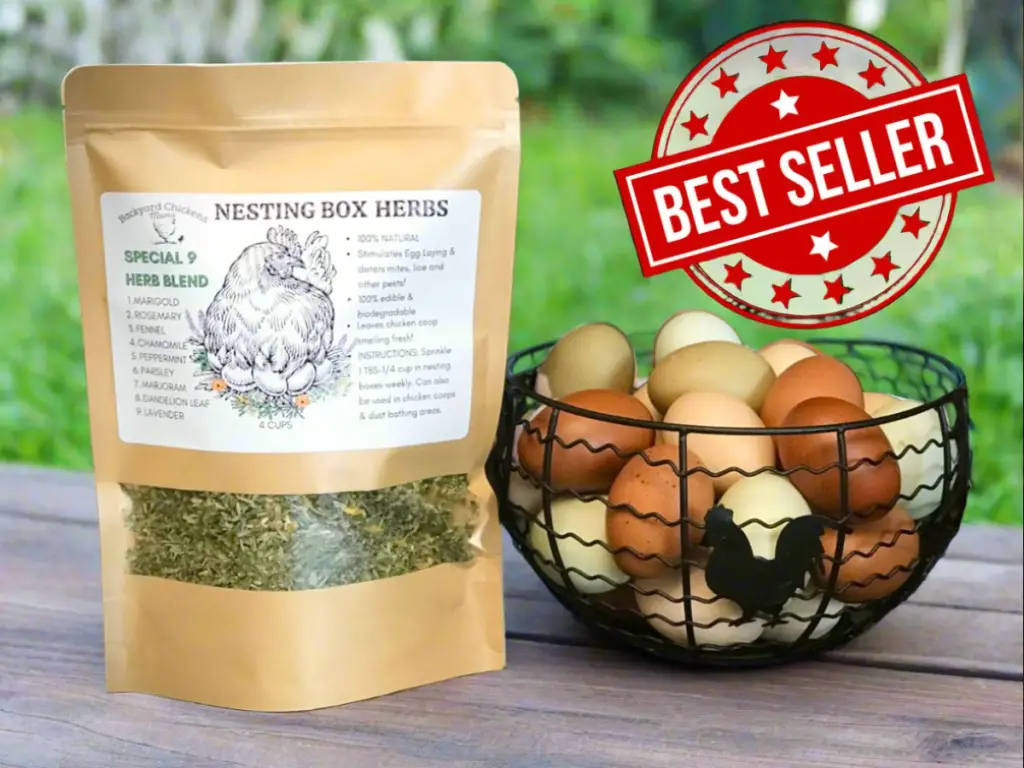
Increases egg laying naturally.
- Improves chicken health.
- Deters parasites: mites, lice, fleas, flies & rodents.
- On SALE!
- SHOP NOW
- If chicken water looks dirty, it needs to be changed out.
- Baby chicks water needs to be cleaned and replenished multiple times, daily. Chicks are good at messing up their water!
- Large chicken waterers that can provide water for your flock for more than one day are fine to just spray the troughs out daily and change out completely every other day. This will prevent mold and algae from growing inside of it.
- Waterers should be given a good scrubbing for sanitization at least once a week, more frequently if it has any visible growth in it.
- During hot weather, waterers may need to be replenished multiple times daily and scrubbed daily as well. Mold grows quicker in the heat, especially if waterers are out in the direct sunlight any part of the day.
PRO TIP: Place your chicken waterers up at your smallest chicken’s shoulder level, to decrease the amount of dirt and debris being kicked in it.
PRO TIP: Use dark containers for your waterers to block the sun. This will slow down algae growth.
PRO TIP: Place your chicken waterers in the shade. This not only will provide cooler water for your chickens, but it will also cut down on algae growth.
2. How to Sanitize a Plastic Chicken Waterer
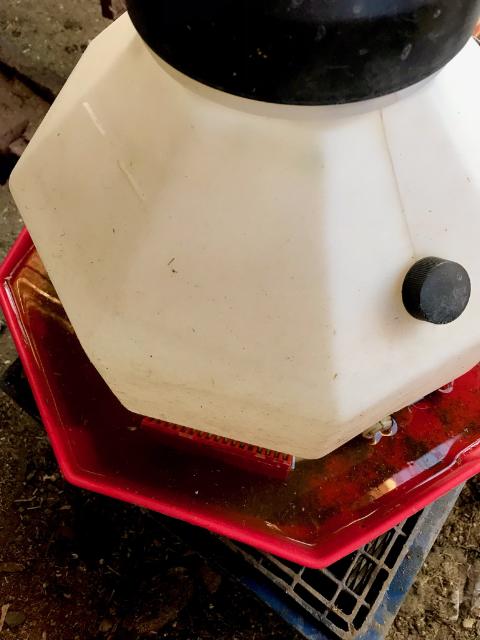
Chicken waterers should be cleaned daily and thoroughly sanitized at least weekly. The best way to sanitize your chicken waterers is to use apple cider vinegar, water and a good scrub brush. An alternative to using ACV is using liquid bleach.
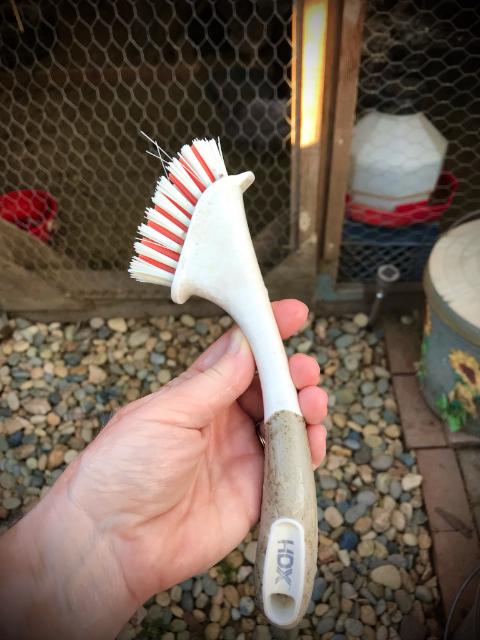
- Get a scrub brush that can fit into all the small troughs and crevices of your waterer. I find that a narrow scrub brush works well for this.
- For a 5 gallon waterer, add 1 TBS of either ACV or liquid bleach to the plastic waterer and 1 gallon of water. I also keep a mixture of this in a spray bottle and use this for spraying the outside of the containers. For smaller waterers, just make up less cleaning solution.
- 1 TBS ACV or bleach to 1 Gallon Water
- 1/2 TBS ACV or bleach to 1/2 Gallon Water
- 1/4 TBS ACV or bleach to 1/4 Gallon Water
- Add the appropriate amount of water to your container.
- Spray the outside of the container with a spray bottle containing the same solution.
- Use your scrub brush and thoroughly scrub every nook and cranny of the container. Do the same for the outside.
- Give it a good spray with your garden hose or sprayer to rinse out all of the dirt, algae and debris. Rinse it well to make sure you do not have any residual smell of ACV or bleach solution.
- I like to give it one more spray using ACV and water solution and set it out in the hot sun for a good 10-15 minutes to kill any more bacteria that may still be lingering.
- Give it a final rinse and fill it up with cool, clean water for your flock.
3. How to Sanitize a Metal Chicken Waterer
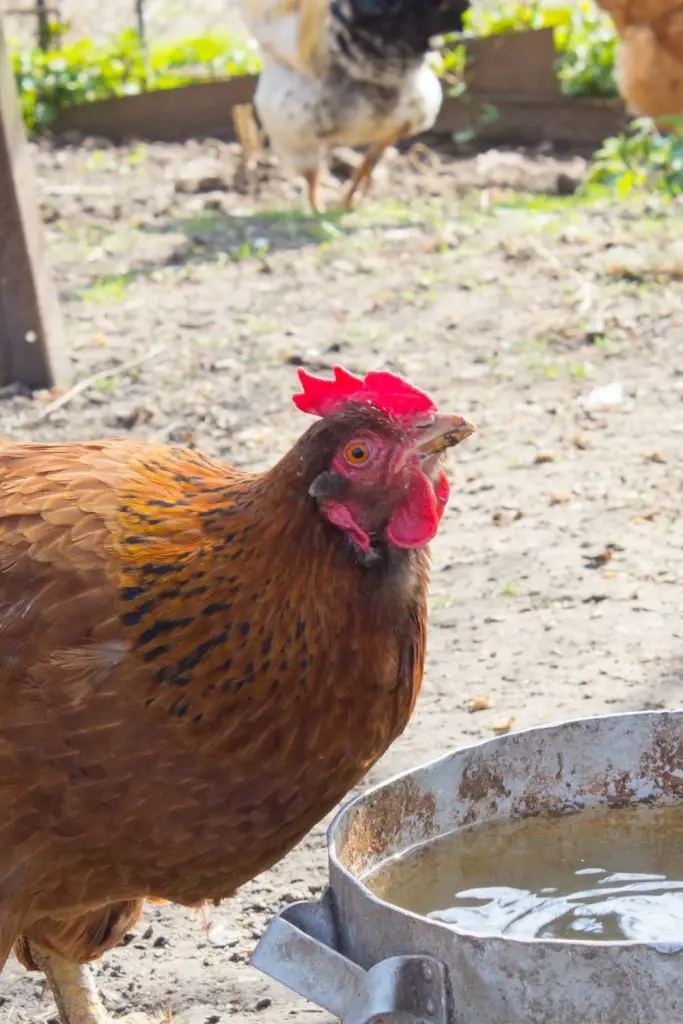
Metal chicken waterers are frequently made out of double coated galvanized steel. The best way to sanitize a metal watering container is by using hot or very warm water, mild dish soap and a soft sponge.
You do not want to use anything acidic, such as ACV. If you want to add apple cider vinegar to the chickens water for increasing their probiotics, use a plastic waterer.
Don’t use bleach inside a metal container for your chickens either. Using ACV or bleach can cause it to rust, releasing harmful particles into the water.
Don’t use steel wool or a harsh scrub brush. It will break down the surface of the container, allowing it to be more susceptible to rusting and releasing the toxic metal zinc into the water.
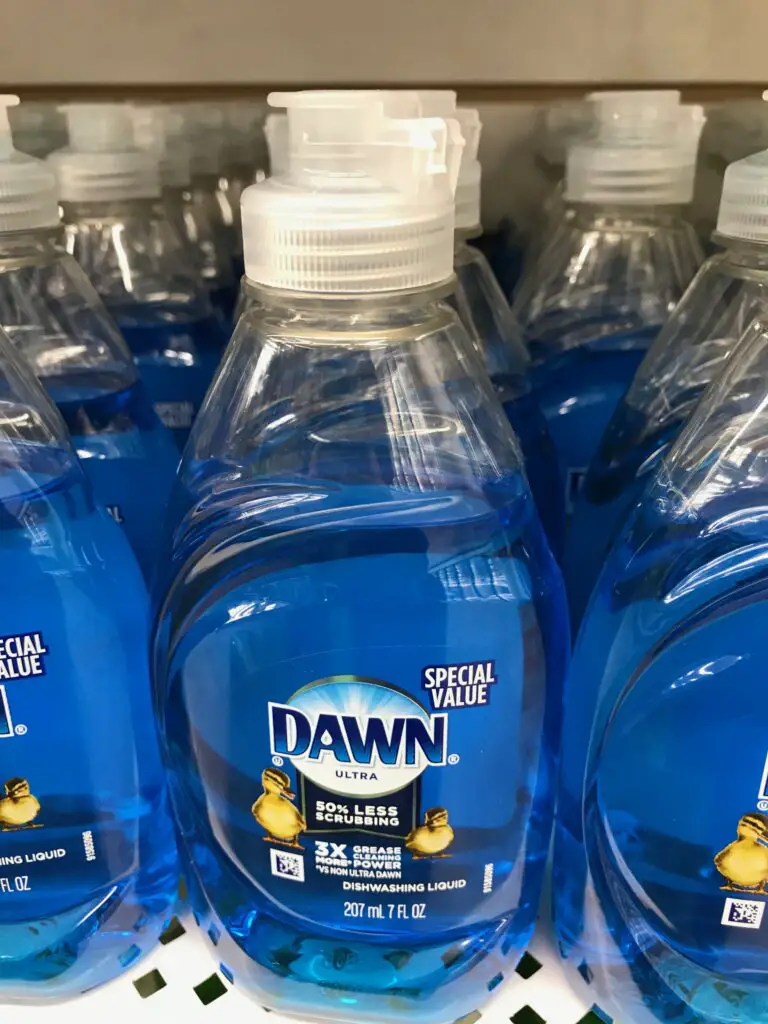
- Rinse metal chicken waterer with hot or very warm water.
- Add 1 tsp. of mild dish soap.
- Use a soft sponge to scrub away any slime or algae.
- Rinse off and refill with cool, clean water for your flock.
4. Should You Put Anything in Your Chicken’s Water?
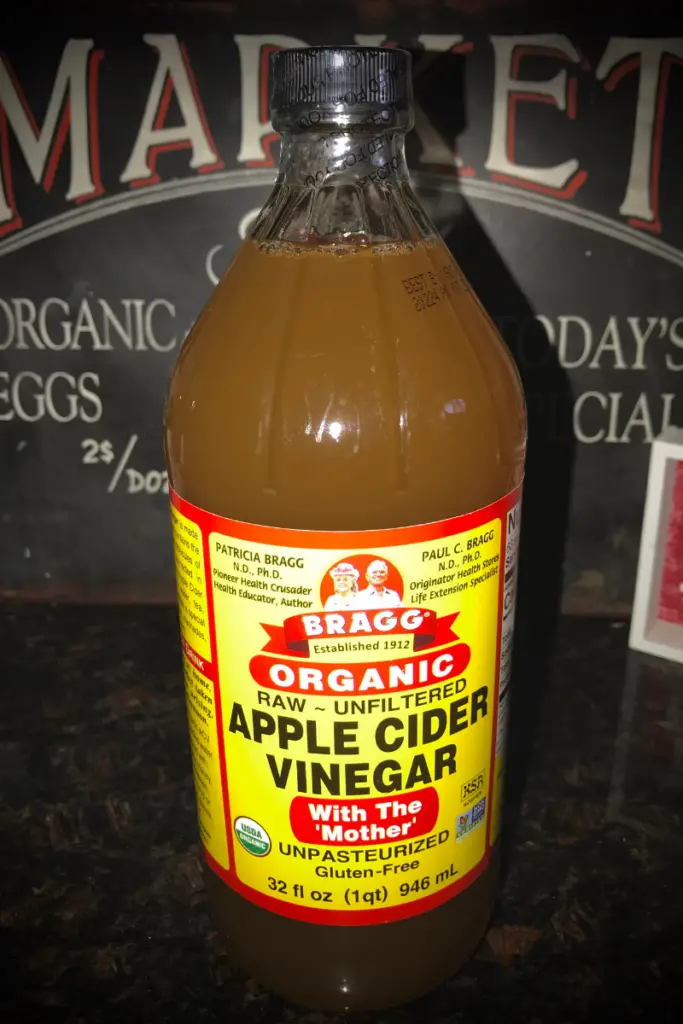
Adding apple cider vinegar to PLASTIC waterers. It is ok to add 1 TBS of water for each gallon of your chicken’s water up to a week at a time, but no more than once a month. This will help to keep algae from forming in the chicken waterer.
WARNING: You shouldn’t add ACV to METAL waterers. Due to the acidity of the apple cider vinegar it can react with certain types of metal, causing it to leech zinc, which is very toxic to birds.
Metal chicken waterers should be routinely checked for any corrosion. Chickens are very curious to anything shiny so are at risk of ingesting odds and end items it sees. Many shiny objects contain zinc such as screws, nuts, bolts, jewelry, zippers, pennies, etc.
Be extra careful not to leave any of your hardware cloth clippings around where chickens visit. This also contains zinc.
WARNING: Do not add bleach to your chicken waterer to prevent algae or bacterial growth. Putting bleach in your chickens daily drinking water can be harmful to your chickens. It can break down your plastic and galvanized metal waterers, releasing harmful chemicals into the drinking water.
For more beneficial ways you can use ACV in and around your chicken coop, read my article 12 Unique Benefits of ACV Around Your Chicken Coop. See below.
Zinc Toxicity from Metal Waterers
| SYMPTOMS OF ZINC TOXICITY IN CHICKENS |
|---|
| LOSS OF BALANCE |
| FALLING |
| INCREASED URINATION |
| INCREASED THRIST |
| VERY WEAK |
| PARALYSIS OF LEGS |
| PALE COMB AND WATTLE |
| ANEMIA |
| WEIGHT LOSS |
5. How to Keep Chicken Waterer from Growing Algae
- Changing your chicken water out more frequently will stop algae from growing.
- Keep your chicken waterers out of direct sunlight. Algae will grow quicker in direct sunlight.
- Store chicken water in a dark container that doesn’t allow sunlight in.
- Once a month, for one week, add 1 TBS of apple cider vinegar per gallon of water to your chicken’s water. The acidity of the ACV will slow the growth of algae.

Increases egg laying naturally.
- Improves chicken health.
- Deters parasites: mites, lice, fleas, flies & rodents.
- On SALE!
- SHOP NOW
6. How to Keep Baby Chick Waterers Clean
Baby chicks like to perch up on top of their waterers. They feel more secure, the higher up they are and roosting on top of a chick waterer is the perfect height for them! Unfortunately, perching up top here means all of the poop falls straight into the water below them.
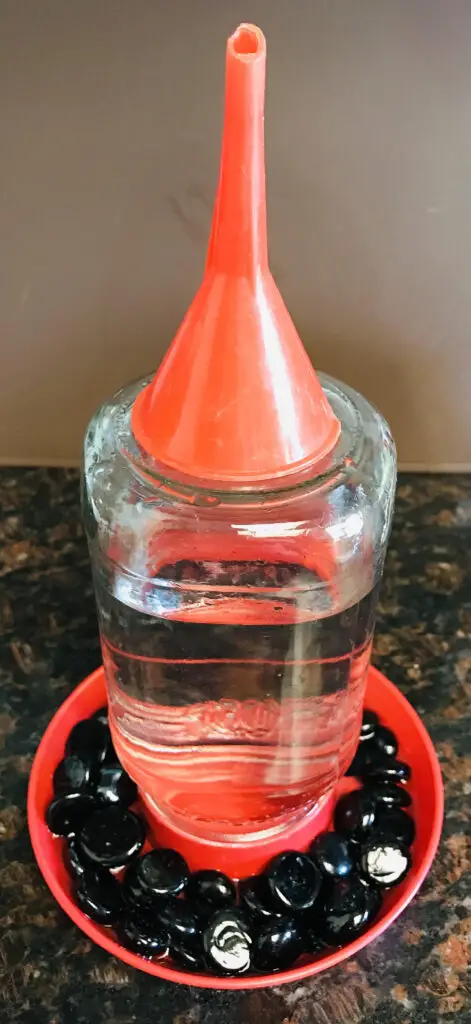
PRO TIP: Place a small funnel on top of the baby chicks food and water containers to deter them from perching. This will stop them from pooping into the water.
PRO TIP: Provide areas for chicks to perch that are higher up. This way they will be less likely to try to get on top of their watering containers.
Chicks are notorious for kicking up their bedding and filling their water with it! I have found the best solution is to make them a raised area, with a screen flooring and without bedding, that they can get to their feed and water.
An alternative to this is placing your chicks water off to the side, just on the outskirts of their heat source. Also, make sure that it is raised up off the ground, but no higher than shoulder level for your smallest chick. This way they are less likely to kick bedding into it…..well, as much bedding into it.
7. How to Identify Deadly Blue-Green Algae
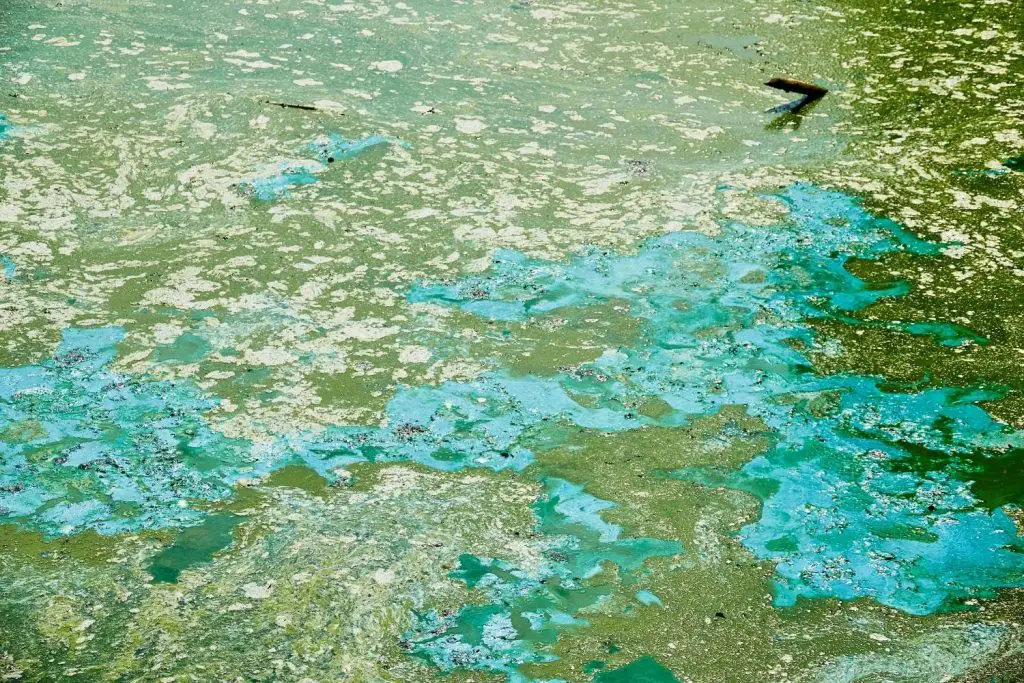
Chickens that are allowed to free range on properties that contain creek beds, lakes, ponds or brackish water need to be aware of the deadly blue-green algae.
While not as common, it can also develop in chicken waterers, buckets and baby pools that have been stagnant (not cleaned) and exposed to hot temperatures and sunshine. This is something that you can control by stepping up on your daily and weekly cleaning.
For those that allow your flock to free-range, is important to be able to identify this algae so you can keep your flock away from it.
- Blue-green algae is a ‘cyanobacteria’ commonly found in shallow areas of creek beds, lakes, ponds and brackish waters.
- It is bluish or greenish in color and looks like scum or a mat on top of the surface of the water.
- Sometimes it can look like foam at the shoreline or even like someone took a can of green or blue paint and threw it into the water.
- Blue-green algae prefers warm, calm, shallow waters. This is why it is usually seen at the edges of creek beds, lakes, ponds or brackish waters.
Some blue-green algae, but not all, can produce hepatotoxins and neurotoxins that if ingested can cause organ and nervous system damage and can even cause death. You cannot tell just by looking at blue-green algae if it is the toxic kind. So if you spot it on your property, you should have a sample of the water tested.
“Harmful algae and cyanobacteria (sometimes called blue-green algae) can produce toxins (poisons) that can make people and animals sick and affect the environment. Learn more about them to keep you and your pets safe.“
CDC
It doesn’t take much hepatotoxins for a chicken to ingest to begin to cause liver failure. The more that a chicken ingests, the quicker the death. Death will usually occur within 24 hours.
If you chicken ingests neurotoxins, death sill usually occur within 30-60 minutes.
| TOXIN | SYMPTOMS OF BLUE-GREEN ALGAE POISONING IN CHICKENS |
|---|---|
| HEPATOTOXIN | PALE COMB/ ORGAN FAILURE DEATH WITHIN 24 HOURS |
| HEPATOTOXIN | WEAKNESS DEATH WITHIN 24 HOURS |
| HEPATOTOXIN | BLOODY DIARRHEA DEATH WITHIN 24 HOURS |
| HEPATOTOXIN | DARK POOP DEATH WITHIN 24 HOURS |
| NEUROTOXIN | PURPLE COMB/ DEATH WITHIN 30-60 MINUTES |
| NEUROTOXIN | RESPIRATORY DISTRESS/ DEATH WITHIN 30-60 MINUTES |
| NEUROTOXIN | TREMORS/ DEATH WITHIN 30-60 MINUTES |
| NEUROTOXIN | PARALYSIS/ DEATH WITHIN 30-60 MINUTES |
| NEUROTOXIN | SEIZURES/ DEATH WITHIN 30-60 MINUTES |
Conclusion: How to Keep Chicken Water Clean
Chickens will drink dirty water if it is in front of them, even if it contains poop, algae, debris, etc. As a chicken owner, it is our responsibility to make sure that we provide them with clean, cool, fresh water daily.
Chicken waterers should be cleaned daily and sanitized appropriately on a weekly basis. This will help to control bacterial and algae growth.
Never add harsh chemicals like bleach to the drinking water because it can cause both plastic and metal waterers to break down, releasing harsh chemicals into the water.
If you have free ranging chickens be aware of blue-green algae. This includes buckets and baby pools with stagnant water that you have out on your property or if you have bodies of water such as a creek bed, pond, lake or any type of brackish water.
If you think you have blue-green algae on your property get a sample of the water tested and keep your chickens away until you know it is safe.
How to Keep Chicken Water Clean- https://www.backyardchickensmama.com/how-to-keep-chicken-water-clean/


